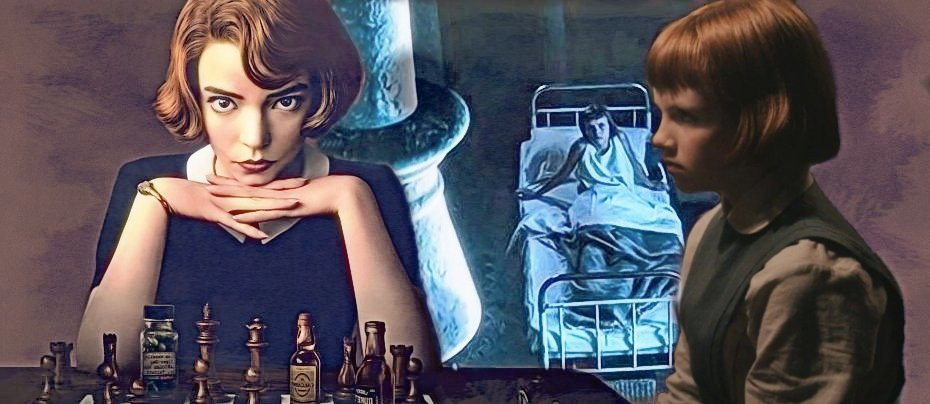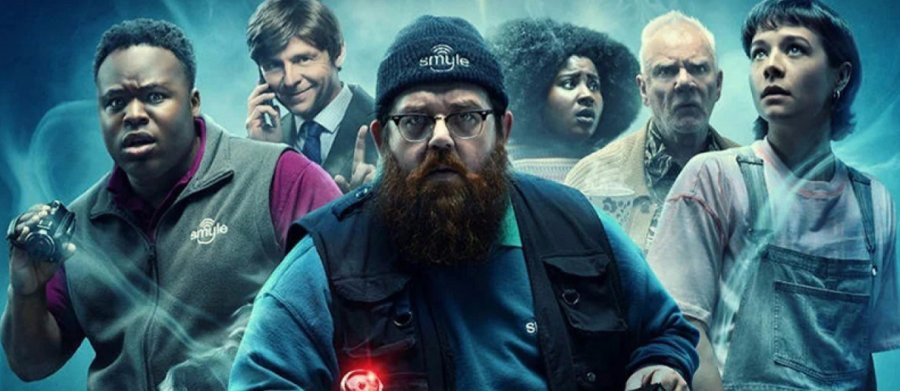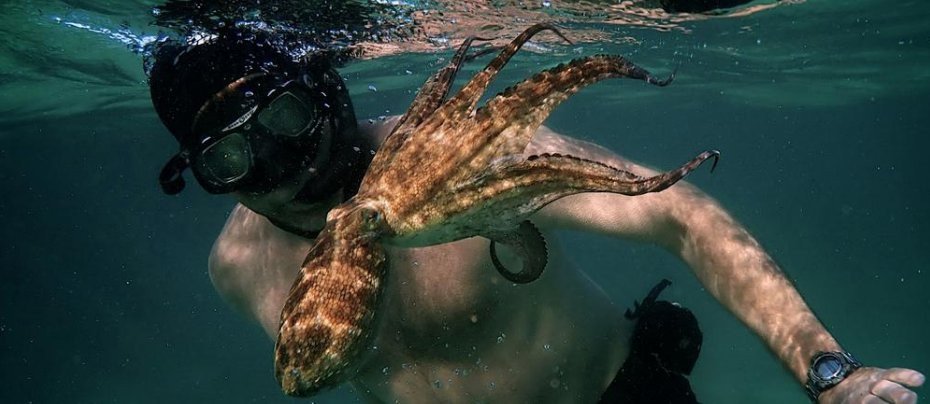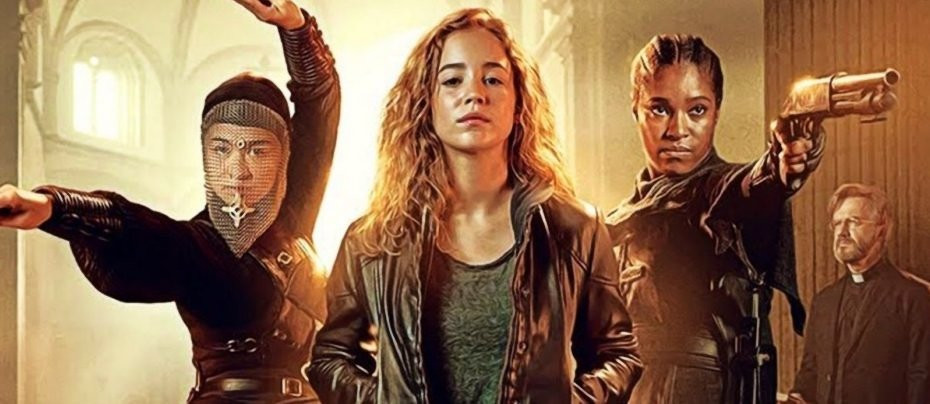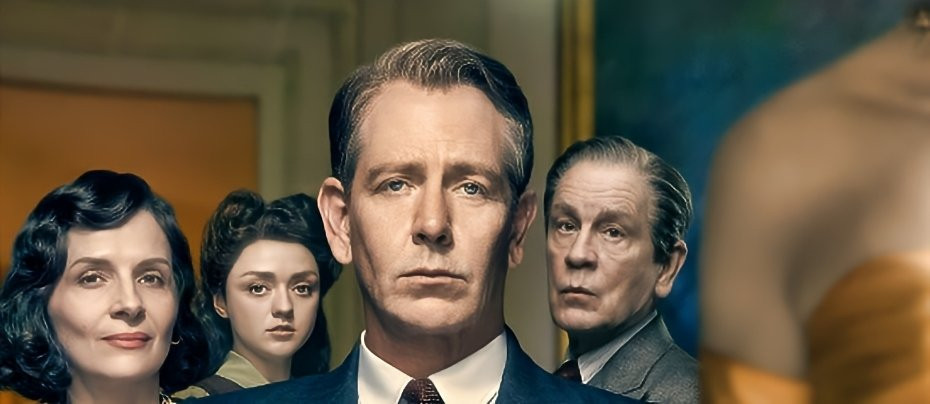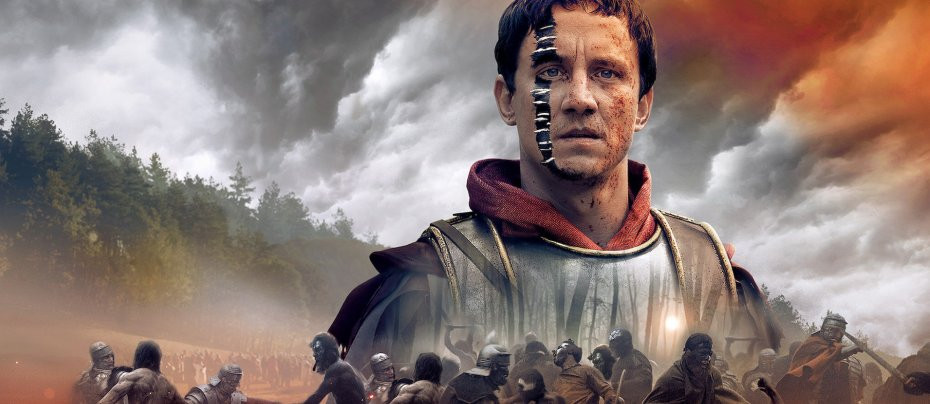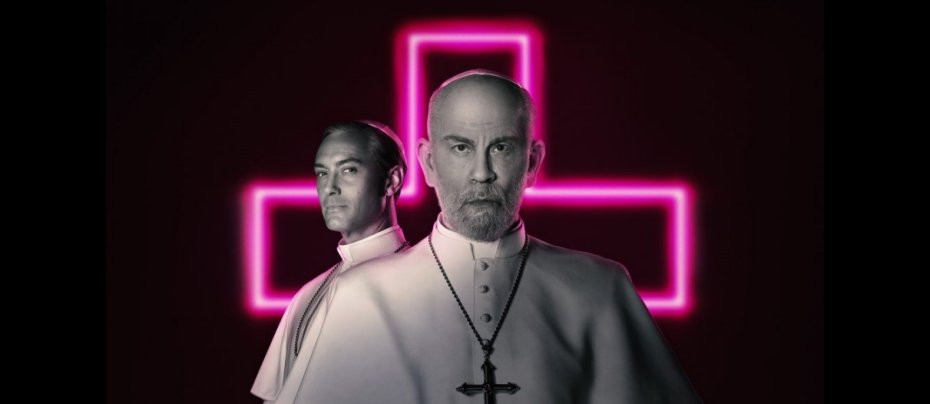
The New Pope
2020 - Italy France Spain“Like ‘The Young Pope,’ it is gorgeous to the eye and the acting is even better”
As much a continuation of The Young Pope as a sequel, The New Pope is nevertheless listed as a separate production by authoritative sources including IMDb, and your reviewer agrees that it is sufficiently distinct to be considered as such.
For one thing, from the very beginning and the opening titles on, it is clear that there is a definite change of style and tone. Where The Young Pope was a relatively straightforward, stately, even epic drama with some surreal moments, The New Pope is more generally surreal but with some moments of genuine human drama. This is a world in which hospitals and nunneries are decaying Baroque buildings fitted out as modern nightclubs, complete with large, psychedelic illuminated crosses.
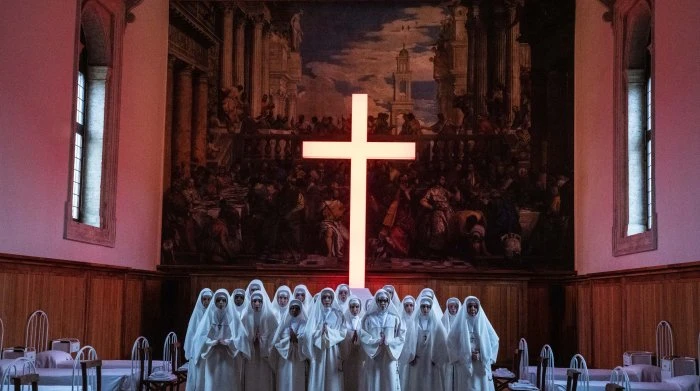
As in some borderline porn 1960s film that wanted to shock, the nuns are mainly sexually frustrated hot young girls. The ultimate manifestation of Executive Producer Paolo Sorrentino's obsession with Fellini is that their Abbess is both a dwarf and a nun.
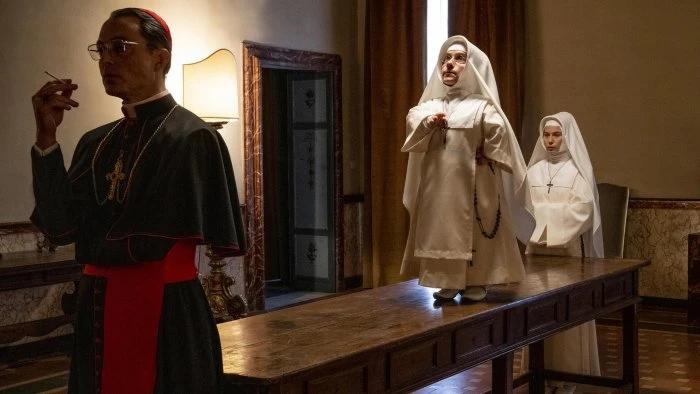
There is at least a discernible plot for most of the series, even if it seems to run out towards the end and is so unlikely that it makes The Young Pope look like a documentary. We begin with the Young Pope, Plus XIII, formerly Lenny Belardo (Jude Law), in an irreversible coma. We all know what irreversible means in the context of television drama. The question is not if he will wake up but when.
Meanwhile, the Roman Catholic Church is in chaos. In addition to the usual problems, Islamic militants are on the rise and a bunch of fanatics are literally idolising the comatose Pope Lenny in the absence of an actual leader. The sinister US Ambassador to the Holy See (Mark Ivanir) makes it clear to the Vatican's Secretary of State, Cardinal Voiello (Silvio Orlando), that a Pope is needed. This is enough for the College of Cardinals to ignore both Canon Law and Roman Catholic doctrine on the sanctity of life - according to which Lenny is still alive - by calling a Conclave to elect a new Pope, hence the title.
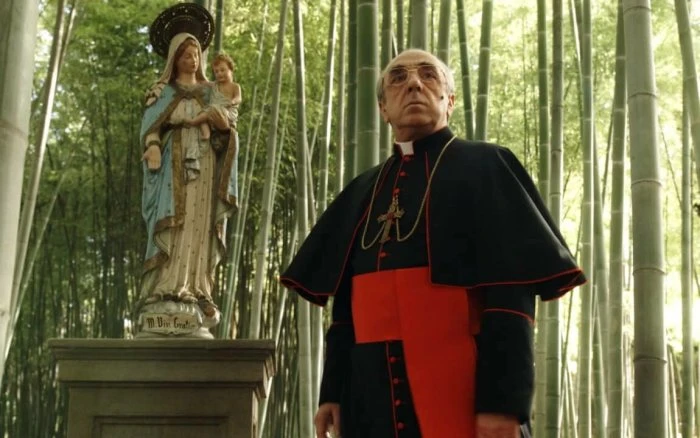
Now one would imagine that, under such circumstances, the Cardinals would be particularly careful not to start the process until they had lined up a thoroughly reliable alternative, especially after the dangerous experiment with Pope Lenny. In The New Pope, however, the shrewdest, best informed, most conservative Electoral College in the world decides instead to double down on eccentricity. There would not be much of a television drama otherwise.
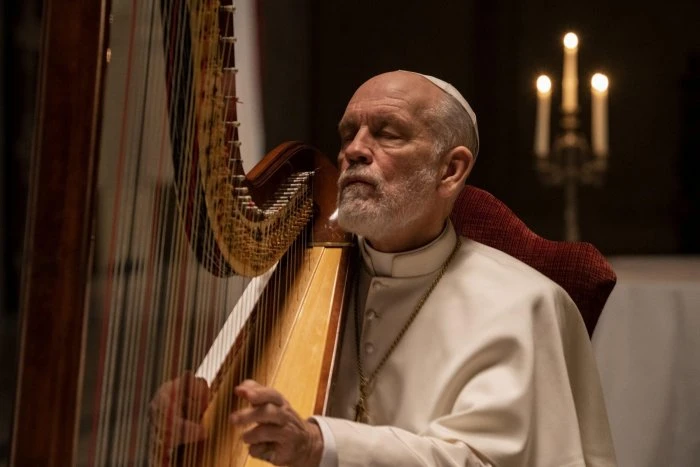
So, after a disastrous false start, the consensus settles on the worst conceivable candidate since an 11th Century teenage sex maniac who ended up selling the Papacy (yes, that happened). This is Cardinal Sir John Brannox (John Malkovich), a reclusive English nobleman who is emotionally crippled by a host of serious psychological issues. We are told that he is a successful diplomat and that he is responsible for the conversion of large numbers of Anglicans to Roman Catholicism, hence his knighthood and his Cardinal's hat, but he appears so detached from the world that it seems impossible for him to have had a career of any sort, let alone to have risen to the top of two competitive hierarchies. Incidentally, there are a lot of details that suggest that the Italian writers do not really understand how the British aristocracy works, but frankly these are relatively minor pinpricks in the authenticity of the script given the gaping holes elsewhere.
It is much harder to accept that the Cardinal Secretary of State and the leading power brokers in the Vatican would be able to spend several days immediately before a Conclave secretly locked away in a stately home, begging a man whose unsuitability becomes more obvious every time he speaks to lead them.
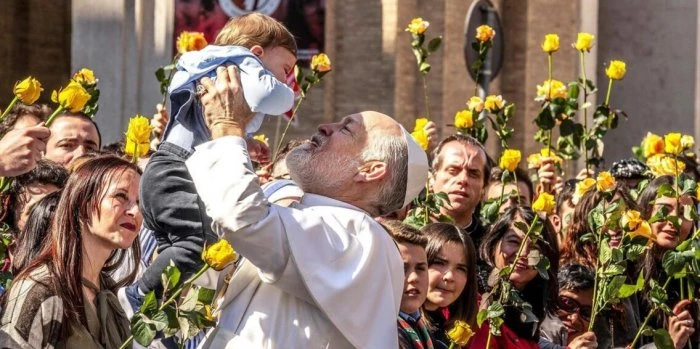
It is perhaps predictable that Brannox uses the Papacy to work through his own emotional issues very publicly. What might be less predictable, and less likely, given that the strength of the Roman Catholic Church is that it has always presented an image of authority and certainty, is that many respond well to this openly emotional appeal, seeing in Brannox a man who understands their own individual vulnerabilities. He offers not so much leadership as a form of therapy, and seems to be receiving the same in his turn. This is the direct opposite of Pope Lenny's uncompromising emphasis on submission and obedience. It also proves inadequate when circumstances force tough decisions on the Pope. In spite of an impressive appearance and manner, he proves weak when put to the test, and one sees why some remain fanatically loyal to Lenny - even when he is unconscious he is the more commanding figure.
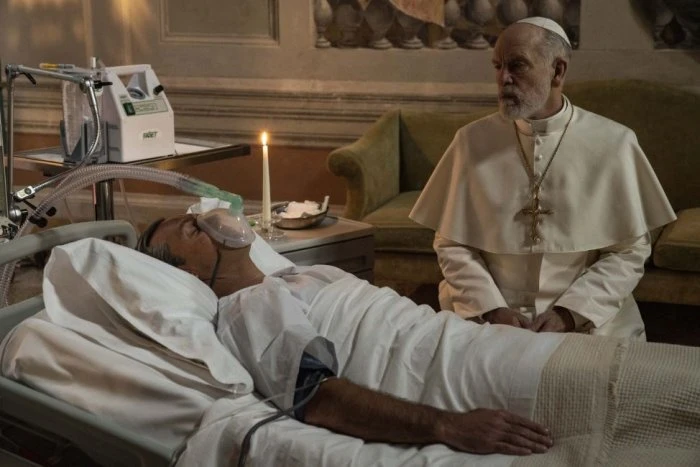
This sets up a potentially interesting confrontation between two different concepts of the Papacy, and of leadership in general, but we never really get it, and the story falls apart completely in the final episode. At least most of the characters get satisfying endings and the very last scene may raise a smile.
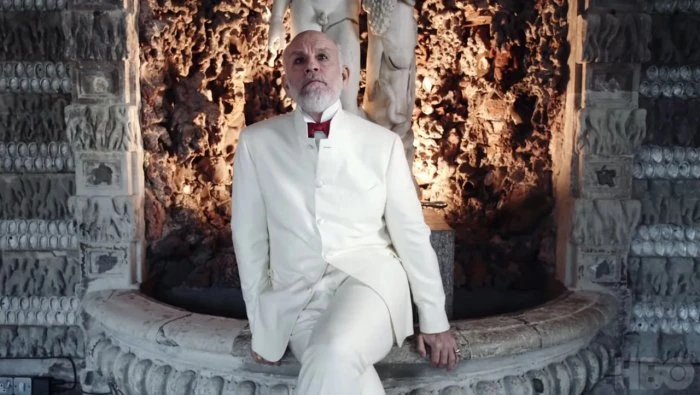
For all of its absurdities, and they are many, The New Pope still remains oddly compelling. This is due in part to Sorrentino's mastery of visual style. While The New Pope lacks much of the grandeur of its predecessor, the photography is still a treat and there are a lot of carefully composed scenes that stick in the mind. Pope Lenny himself makes a "meta" reference to this when apparently speaking to camera in front of a scarlet backdrop of massed Cardinals.
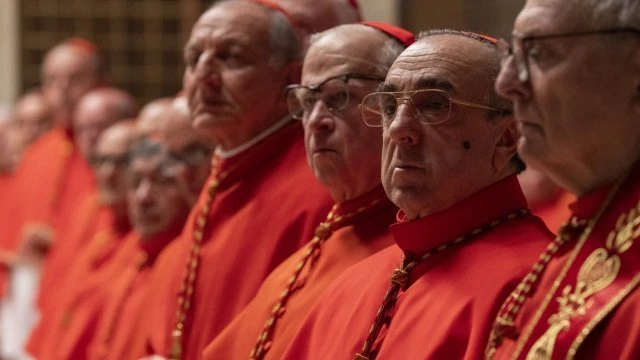
It is, however, the strength in depth of the international cast that really makes The New Pope so watchable in spite of its deficiencies. Malkovich is one of those fascinating actors whose presence in even a bad film makes it worth a look. If his Brannox is an impossible Pope, he is still an interesting character study is his own right. We come to care about him and rejoice in the faint glimmer of hope from an unexpected direction that suggests that the unhappy Pope might yet find happiness as a man.
Lenny evolved during The Young Pope, and he evolves more here. The confused charlatan has become a calm, saintly, caring presence. However, there are suggestions that part of the old Lenny remains, and he is unsure himself how much he has changed and why. The ambiguity is maintained to the end. Is this a reference to the dual nature of Christ? If so, it is clumsy, but Law does well to keep both sides of the character in sight.
In many ways, Cardinal Voiello is the most substantial and the most sympathetic character in The New Pope We see more of the humanity of the manipulative bureaucrat and it is hard not to love him. He also evolves, learning through suffering and loss.
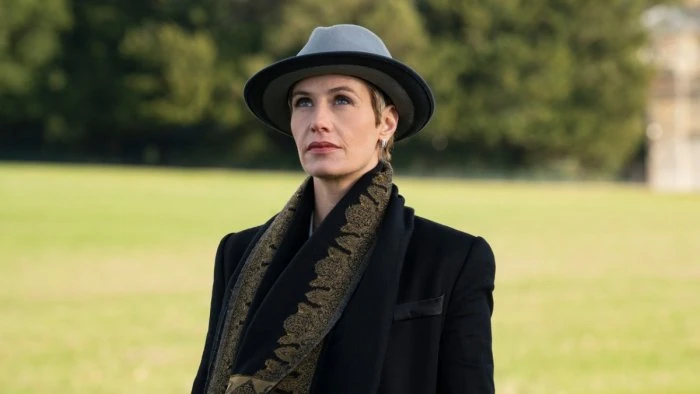
The same is true of many of the supporting characters. Cecile de France does well to maintain the credibility of a dynamic career woman at the heart of the Vatican who hides vulnerabilities of her own behind a façade of self confidence. Ulrich Thomsen and Yuliya Snigir are moving as Lenny's cardiologist and his wife, decent people whose marriage is blighted by their son's illness. Ivanir enjoys himself as a man determined to prove a villain who actually does some good. So does Antonio Petrocelli as Voiello's assistant, living up to his job description of being there to make everyone feel uncomfortable. Massimo Ghini channels Alex Rocco as a wonderfully smooth, urbane Cardinal who helpfully takes care of the Vatican's banking arrangements: we see where this is going, and so does Brannox, even if he feels powerless to stop it. Henry Goodman is the perfect butler, with shades of Denholm Elliott. Ludivine Sagnier is poignant as Lenny's most sincere disciple, but her story arc is disappointing and seems ultimately untrue to everything that has been established about her before.
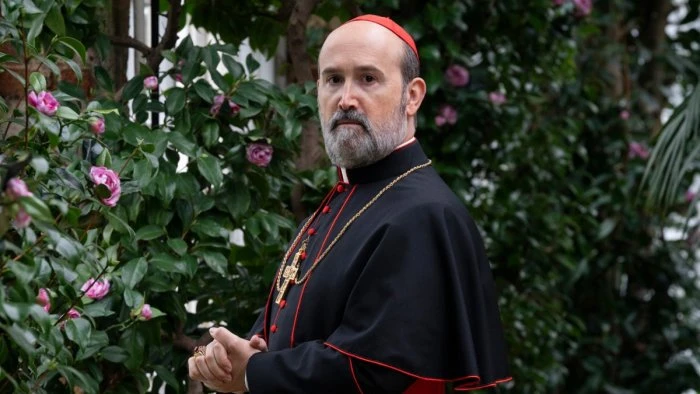
The dialogue aspires to be profound but falls short. While there are some quotable and even thought-provoking lines, too many of the conversations sound like intelligent and well-read people desperate for everyone to know they are intelligent and well read. They reach for clever sounding things to say in response to clever sounding things that have just been said rather than develop coherent arguments. There is in particular a great deal of talk about love without much depth or understanding. It all amounts to little more than exchanges of aphorisms.
It is in fact curious how what is described as a religious drama about religious people is unwilling to engage with religious thought and feeling. The inner monologues of the Cardinals lack all conviction. They are reduced to types. Above all, it is unrealistic that devout Christians are shown as talking and thinking so little about Christ.
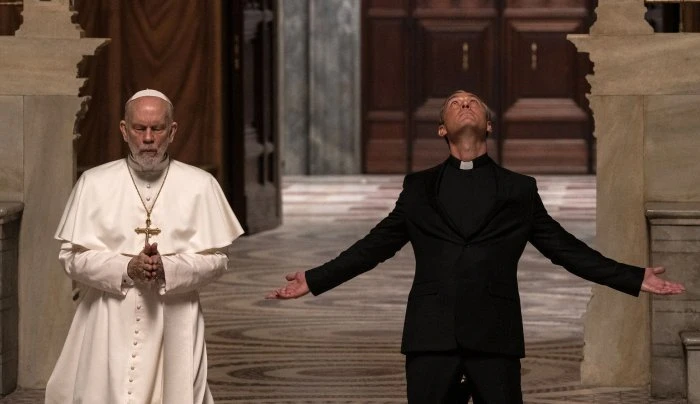
This is doubly regrettable because The New Pope is noble in its aspiration to be an unashamedly intellectual piece. If it fails in this, at least it fails honourably and, in failing, it does no worse than The Young Pope and most other recent attempts at religious or philosophical drama. The sad truth is that we live in superficial times, and the people who write and produce our stories, however talented they might be, reflect that superficiality. Even if an unusually deep thinking scriptwriter happened to be employed, his words would have to get through several layers of more commercially minded producers and executives, all with their own assumptions about what the public will bear.
Yet, if it is a failure, The New Pope is a glorious failure. Like The Young Pope, it is gorgeous to the eye and the acting is even better. The negativity of this review is perhaps excessive, a reflection of the frustration felt in seeing the potential for something great here that never quite emerges. Even as it is, it is still superior to most recent television, and merits watching as a well produced and well played drama of ideas with interesting, three dimensional characters.
John Winterson Richards' website can be found here: John Winterson Richards
Seen this show? How do you rate it?
Seen this show? How do you rate it?
Published on January 26th, 2022. Written by John Winterson Richards for Television Heaven.


